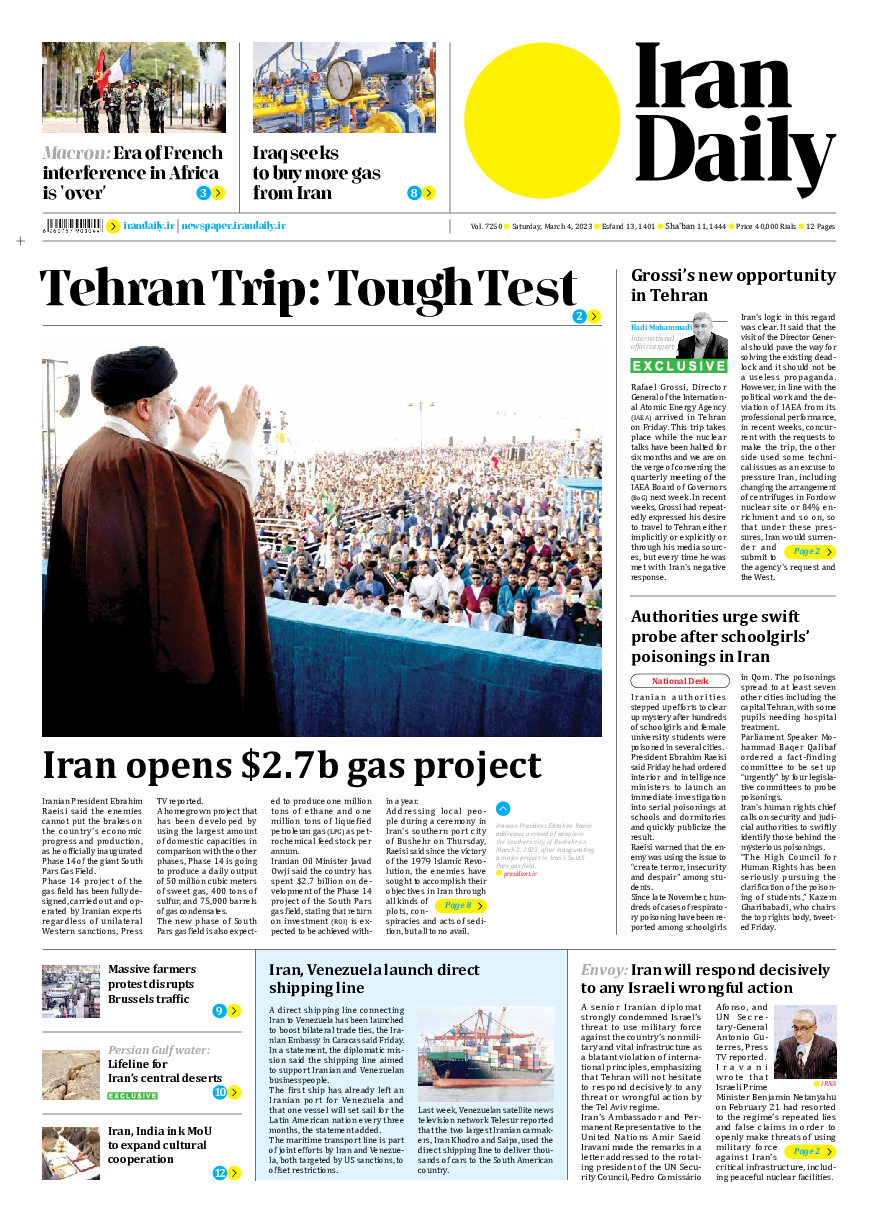
Grossi’s new opportunity in Tehran
Hadi Mohammadi
International affairs expert
Rafael Grossi, Director General of the International Atomic Energy Agency (IAEA) arrived in Tehran on Friday. This trip takes place while the nuclear talks have been halted for six months and we are on the verge of convening the quarterly meeting of the IAEA Board of Governors (BoG) next week. In recent weeks, Grossi had repeatedly expressed his desire to travel to Tehran either implicitly or explicitly or through his media sources, but every time he was met with Iran’s negative response.
Iran’s logic in this regard was clear. It said that the visit of the Director General should pave the way for solving the existing deadlock and it should not be a useless propaganda. However, in line with the political work and the deviation of IAEA from its professional performance, in recent weeks, concurrent with the requests to make the trip, the other side used some technical issues as an excuse to pressure Iran, including changing the arrangement of centrifuges in Fordow nuclear site or 84% enrichment and so on, so that under these pressures, Iran would surrender and submit to the agency’s request and the West.
Despite such media hype, this never happened. Instead, it was decided to resolve the issues in the form of dialogue with the presence of Massimo Aparo, Grossi’s deputy for Safeguards. Aparo came to Tehran last week and in several rounds of negotiations with the Iranian side, the issues that arose in recent weeks, which were caused by the IAEA’s mischief and political games were resolved.
Now, the IAEA director general is in Tehran concurrent with a time when everyone’s eyes are on his Safeguards report, which has always tried to put pressure on Iran with claims about three allegedly undeclared nuclear sites in Iran. Political pundits believed that this is the main reason for the pause in the nuclear talks. In the last few years, Grossi has shown that he is a professional in implementing what the West dictates to him as much as his unprofessionalism and politicking in his reports on Iran. This is why he requested a trip to Tehran and even the exaggeration in the IAEA’s recent report can be described as a pulse on the part of Europe and the United States to boost the nuclear deal revival talks atmosphere, even though no such words are said or even people like U.S. State Department Spokesman Ned Price and EU coordinator Enrique Mora continue to state that the JCPOA revival is not on the agenda.
However, it seems that this new opportunity given by Tehran to the Director General should be appreciated by the IAEA and Western countries, so that if they are really worried about Iran’s stunning nuclear progress, would try to resolve the issue and revive the nuclear deal through a diplomatic solution and the use of diplomatic tools, which is the only viable way available.
As the recent IAEA report states, Iran’s nuclear reserves are 18 times that of stated in the JCPOA. Iran also has adequate reserves of 20% and 60% enriched uranium to the extent that, according to the U.S. Deputy Secretary of Defense, Iran’s 12-month breakout to building an atomic bomb during the JCPOA era has now reached 12 days. All these nuclear developments, which can be worrying for the other side on the one hand, and the declaration of Iran’s interest in dialogue and a diplomatic way to solve the issue, on the other hand, represent an important and great opportunity for Grossi. Until now, Tehran has witnessed nothing but unprofessional actions from the IAEA chief and he should think about his major role in resolving the existing nuclear tension. Grossi and his delegation know that the solutions to the issue of the three alleged sites have already been stated in the understandings that have already been reached and if there is political will, this issue can be resolved quickly. Yet, the important thing is the will, which apparently has not been witnessed so far. However, this trip can be promising.
Grossi, who returns to Vienna from Tehran on Saturday night, should publish his Safeguards report on Iran. The content of that report should be written in a way that it would not give excuses to the European and American parties and does not block the path to interact with Iran, as well as the behavior of the other side in the IAEA BoG. The meeting should not move towards the approval of a new censure resolution against Iran and must have a positive message for Tehran to continue giving diplomacy a chance to reach a final agreement. This is a win-win game for everyone. It only requires political will and moving away from the imaginary media hype surrounding Tehran and its internal issues.







